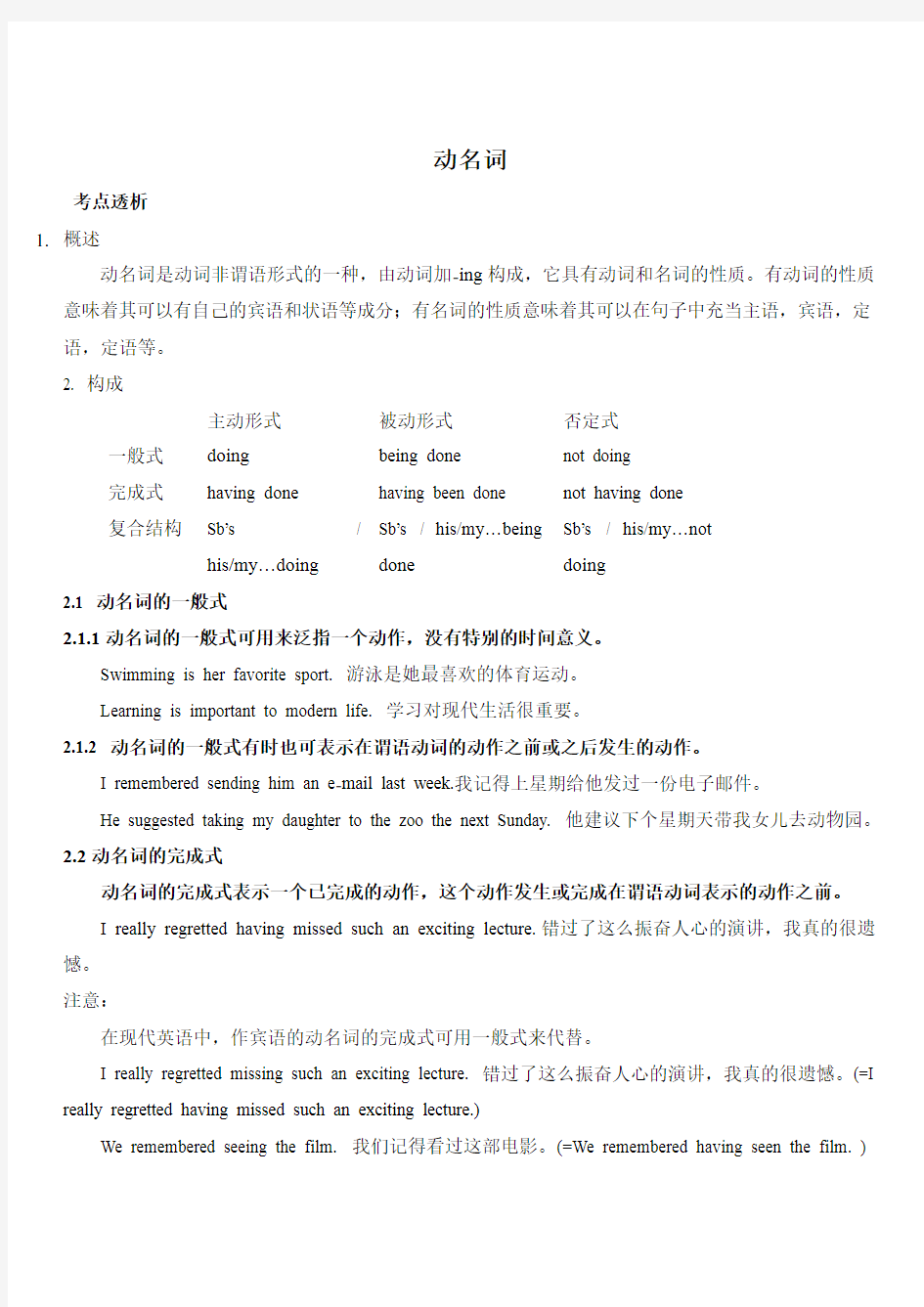高中英语 动名词专项讲解

- 1、下载文档前请自行甄别文档内容的完整性,平台不提供额外的编辑、内容补充、找答案等附加服务。
- 2、"仅部分预览"的文档,不可在线预览部分如存在完整性等问题,可反馈申请退款(可完整预览的文档不适用该条件!)。
- 3、如文档侵犯您的权益,请联系客服反馈,我们会尽快为您处理(人工客服工作时间:9:00-18:30)。
动名词
考点透析
1.概述
动名词是动词非谓语形式的一种,由动词加-ing构成,它具有动词和名词的性质。有动词的性质意味着其可以有自己的宾语和状语等成分;有名词的性质意味着其可以在句子中充当主语,宾语,定语,定语等。
2. 构成
主动形式被动形式否定式
一般式doing being done not doing
完成式having done having been done not having done
复合结构Sb’s /
his/my…doing Sb’s / his/my…being
done
Sb’s / his/my…not
doing
2.1 动名词的一般式
2.1.1动名词的一般式可用来泛指一个动作,没有特别的时间意义。
Swimming is her favorite sport. 游泳是她最喜欢的体育运动。
Learning is important to modern life. 学习对现代生活很重要。
2.1.2 动名词的一般式有时也可表示在谓语动词的动作之前或之后发生的动作。
I remembered sending him an e-mail last week.我记得上星期给他发过一份电子邮件。
He suggested taking my daughter to the zoo the next Sunday. 他建议下个星期天带我女儿去动物园。
2.2动名词的完成式
动名词的完成式表示一个已完成的动作,这个动作发生或完成在谓语动词表示的动作之前。
I really regretted having missed such an exciting lecture. 错过了这么振奋人心的演讲,我真的很遗憾。
注意:
在现代英语中,作宾语的动名词的完成式可用一般式来代替。
I really regretted missing such an exciting lecture. 错过了这么振奋人心的演讲,我真的很遗憾。(=I really regretted having missed such an exciting lecture.)
We remembered seeing the film. 我们记得看过这部电影。(=We remembered having seen the film. )
2.3 动名词的被动形式
动名词的被动形式表示它的逻辑主语是动名词表示的动作的承受者。
2.3.1一般式的被动形式
I can't stand being kept waiting.我不堪久候。
2.3.2完成式的被动形式
I heard of his having been chosen to be the coach of the team. 我听说他被选为球队的教练。
2.4 动名词的否定形式
动名词的否定形式是由not 加现在分词构成。
His not coming made everyone present very disappointed.他没来使在场的每个人都很失望。
I'm sorry for not being present at the meeting in time. 我很抱歉没能按时赴会。
2.5 动名词的复合形式
当动名词本身有其逻辑主语时,就形成了动名词的复合形式。动名词的复合形式一般有所有格或物主代词加动名词构成。
2.5.1 逻辑主语是有生命的名词:作主语时,需用所有格或物主代词;作宾语时,也可以用普通格或人称代词的宾格,这种情况在口语中更常见。
I don’t mind Mike’s/ his smoking here.
I don’t mind Mike/him smoking here.
2.5.2 逻辑主语是无生命的名词时,只用名词普通格。
Is there any hope of our team winning the match?
I don’t know about the weather being so awful in this area.
2.5.3 逻辑主语是复合不定代词somebody, something, anybody, anything, everything等时,只用普通格。
She was disturbed by someone smoking outside.
They complained about everything going wrong.
2.5.4 逻辑主语是复数名词,或由一个以上的名词构成的词组,只用普通格。
Do you know Mary and her mother coming to see us next month?
It was quite unexpected the students finishing the exam so soon?
3. 动名词的用法
3.1 作主语
3.1.1 动名词直接放到句首作主语
Seeing is believing. 百闻不如一见。
Collecting stamps is interesting. 集邮很有趣。
Learning about a language is easier than using it. 学习有关语言的知识比使用语言容易。
Being invited to the party was a great honor to the family. 被邀请参加晚会是这家人的荣耀。
3.1.2 为了保持句子平衡,通常用先行词it作形式主语,而把真正的主语放在句末。
It is easy making plans, but it is difficult carrying them. 制定计划很容易,实行它却很难。
It is no use crying over spilt milk. 作无益的后悔是没有用的。
It's a waste of time arguing about it. 争论这事是浪费时间。
3.2 作宾语
3.2.1作动词的宾语
能用动名词作宾语的及物动词可分两类,一类是只能用动名词作宾语,另一类是既可用动名词作宾语,也可用不定式作宾语。(即可动名词又可不定式的动词见非谓语动词区分部分)常见的只接动名词而不接不定式作宾语的动词有
admit, advise, allow, anticipate, appreciate, avoid, bear, consider, delay, deny, dislike, encourage, endure, enjoy, ensure, escape, excuse, face, fancy, finish, forbid, forgive, involve, imagine, include, keep, mention, mind, miss, pardon, practice, resist, risk, recommend, suggest, stand, tolerate, understand
Fancy meeting you here! 想不到在这儿见到你了!
I suggest doing it in a different way. 我建议用另一种方法做这件事。
They didn't mind being treated like guests. 他们不在乎被人当作宾客对待。
They admitted smoking/ having smoked in the hall.他们承认在大厅里抽过烟。
He couldn't help laughing. 他情不自禁地笑了起来。
I can't imagine the boy speaking so rudely to you. 我不能想象这个男孩对你说话这么没礼貌。
3.2.2 作短语的宾语
绝大多数动词短语要求跟动名词。
3.2.2.1 以副词结尾的动词短语
put off, give up
3.2.2 作介词宾语
